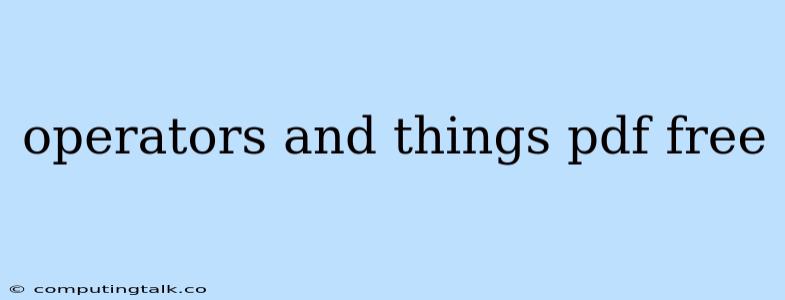Operators and Things: A Guide to Understanding Programming Concepts
Programming can seem daunting at first, but understanding the core concepts, like operators and things, is essential for building any kind of software. This guide will explore the fundamental role of operators and "things" in programming, providing a clear foundation for your journey into the world of code.
What are Operators?
Operators are the symbols used in programming to perform operations on data. They act as the verbs of your code, directing actions and manipulations. Imagine them as tools in a programmer's toolbox, each designed for a specific task.
Common Operators
- Arithmetic Operators: These handle basic mathematical calculations:
- + (addition): Adds two values together (e.g.,
5 + 3 = 8). - - (subtraction): Subtracts one value from another (e.g.,
10 - 4 = 6). - * (multiplication): Multiplies two values (e.g.,
2 * 6 = 12). - \ (division): Divides one value by another (e.g.,
15 / 3 = 5). - % (modulo): Returns the remainder after division (e.g.,
10 % 3 = 1).
- + (addition): Adds two values together (e.g.,
- Comparison Operators: These compare values and return a boolean result (true or false):
- == (equal to): Checks if two values are equal (e.g.,
5 == 5is true). - != (not equal to): Checks if two values are not equal (e.g.,
5 != 7is true). - > (greater than): Checks if one value is greater than another (e.g.,
8 > 5is true). - < (less than): Checks if one value is less than another (e.g.,
3 < 10is true). - >= (greater than or equal to): Checks if one value is greater than or equal to another (e.g.,
10 >= 10is true). - <= (less than or equal to): Checks if one value is less than or equal to another (e.g.,
4 <= 7is true).
- == (equal to): Checks if two values are equal (e.g.,
- Logical Operators: These combine boolean expressions:
- && (and): Returns true if both expressions are true (e.g.,
true && trueis true). - || (or): Returns true if at least one expression is true (e.g.,
true || falseis true). - ! (not): Inverts the truth value of an expression (e.g.,
!trueis false).
- && (and): Returns true if both expressions are true (e.g.,
- Assignment Operators: These assign values to variables:
- = (assignment): Assigns the value on the right to the variable on the left (e.g.,
x = 5). - += (addition assignment): Adds the right operand to the left operand and assigns the result to the left operand (e.g.,
x += 3is equivalent tox = x + 3). - -= (subtraction assignment): Subtracts the right operand from the left operand and assigns the result to the left operand (e.g.,
x -= 2is equivalent tox = x - 2). - = (multiplication assignment): Multiplies the left operand by the right operand and assigns the result to the left operand (e.g.,
x \= 4is equivalent tox = x * 4). - /= (division assignment): Divides the left operand by the right operand and assigns the result to the left operand (e.g.,
x /= 2is equivalent tox = x / 2). - %= (modulo assignment): Calculates the modulo of the left operand and the right operand and assigns the result to the left operand (e.g.,
x %= 3is equivalent tox = x % 3).
- = (assignment): Assigns the value on the right to the variable on the left (e.g.,
What are Things?
In programming, "things" refer to the data that operators work with. These are the nouns of your code, representing the information your program processes. Things can be various types, including:
- Numbers: Integers (whole numbers), floats (decimal numbers), and complex numbers.
- Strings: Sequences of characters (e.g., "Hello World").
- Booleans: True or false values.
- Variables: Named containers that store values.
- Arrays: Ordered collections of elements.
- Objects: Data structures containing key-value pairs.
Operators and Things in Action
Let's look at an example to see how operators and things interact:
# Example using Python
# Define a variable called "age" and assign it a value
age = 25
# Use the "+" operator to add 10 to the age variable
age += 10
# Print the updated age
print("Your age is:", age)
# Output: Your age is: 35
In this example, "age" is a thing, a variable that holds the value 25. The += operator acts on this variable, adding 10 to its value.
Why are Operators and Things Important?
Understanding operators and things is crucial because they are the building blocks of every program. Without operators to manipulate data and things to hold and represent information, programs would be unable to perform even the simplest tasks.
Conclusion
Operators are the actions, the verbs, and things are the data, the nouns, in the language of programming. Mastering their interaction is essential for writing any program, from simple scripts to complex applications. By understanding these fundamental concepts, you'll be well on your way to becoming a confident programmer.
